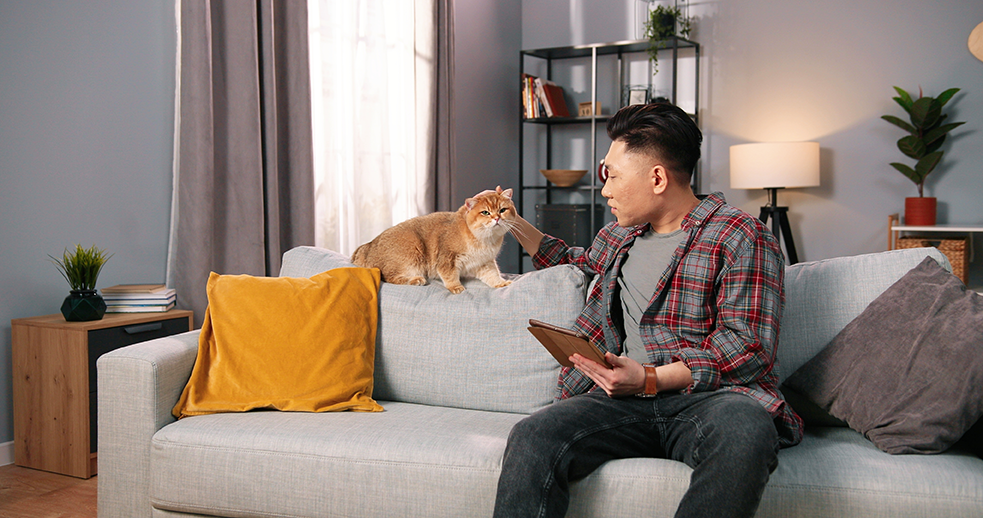Tenancy laws in Australia can get a little tricky as the state-specific rules can differ considerably for both renters and property owners.

Before moving into your rental apartment, you should be aware of your rights as a renter in your respective state. Here’s a state-by-state list of tenancy laws covering eviction, pets and inspections that we hope you find helpful.
The Australian Capital Territory rental laws
Eviction
In the ACT, your landlord can’t evict or ask you to move out during a fixed-term agreement unless you’ve broken the terms of the tenancy agreement.
But if your agreement is periodic – i.e. it has a commencement date but no expiry date – they can evict you with one month notice with cause and 26 weeks’ notice without one.
As the tenant, you are able to break a lease early without breaching a tenancy agreement if it is agreed to in writing to terminate the agreement.
Keeping Pets
The Australian Government passed a law in February 2021 that unless the landlord has reasonable grounds to refuse a request for a pet, the tenant shall be allowed to keep one.
Inspections and landlord’s property access rights
For routine inspections, your landlord must give you at least seven days’ notice, conducting their business between 8 am and 6 pm, leaving out Sundays and public holidays.
Approximately four of these routine inspections are allowed per year.
Queensland rental laws
Eviction
On a fixed agreement in Queensland, your landlord cannot evict you unless, of course, you come to an agreement with them or breach the contract.
But if you have a periodic agreement, the landlord can ask you to evict with two months’ notice.
Keeping Pets
It’s a bit tricky when it comes to Queensland, as you need to get written approval to have a pet in your rented space.
And according to the official statistics, just 10 per cent of landlords allow pets inside their rental properties.
Inspections and landlord’s property access rights
In Queensland, landlords are required to give a seven days’ notice and can conduct a routine inspection once every quarter.

New South Wales rental laws
Eviction
In NSW, the landlord cannot end the fixed agreement but can give you a notice 30 days in advance as soon as the agreement ends.
But with periodic lease, 90 days’ notice is issued. And in a breach of contract, two weeks and you will be asked to leave.
Keeping Pets
The law in NSW doesn’t keep you from owning a pet, but they also don’t keep your landlords from sneaking in pet-preventing clauses into leasing agreements.
So before moving your little friend in with you, you might have to ask for your landlord’s permission.
Inspections and landlord’s property access rights
In NSW – as in ACT – seven routine inspections are allowed, four in a 12-month period.
Victoria rental laws
Eviction
In Victoria, the lease after the end of the fixed agreement is on a month-to-month basis. However, for eviction, 60 days’ notice plus cause is required.
The notice period doubles in number if they are unable to provide a reason, i.e. 120 days.
Keeping Pets
The Residential Tenancies Act 1997 provides that a landlord must not unreasonably refuse a tenant’s request to keep a pet on the premises.
But they can include a reasonable condition in the tenancy agreement prohibiting or restricting the keeping of pets on the premises.
Inspections and landlord’s property access rights
In Victoria, your landlord must give you at least 24 hours’ notice before the inspection, but they can do it only twice in one year – once in the first two quarters.

South Australia rental laws
Eviction
At the end of a fixed-term lease in South Australia, 28 days notice should be issued, which can be extended to 60 in case the landlord decides to sell or demolish the property.
In case they are unable to provide a solid reason, the notice extends to a full three months.
Keeping Pets
In South Australia, there are no specific laws regarding keeping pets in rented properties.
However, landlords and tenants should discuss the matter prior to signing the tenancy agreement to ensure that both parties are aware of, and agree to, any conditions regarding pets.
If there is no mention of pets in the tenancy agreement, it is generally assumed that pets are not allowed.
Inspections and landlord’s property access rights
Landlords are allowed to inspect the property once every month with a 7-14 day notice.
Western Australia rental laws
Eviction
Tenants in Western Australia are to be provided with a minimum of 30 days’ notice at the end of a fixed-term tenancy, only upon selling.
Failure to provide a reason can extend the notice to 60 days.
Keeping Pets
In Western Australia, it gets tricky again – you need to have the landlord’s permission and also include your pet on the lease.
On top of that, landlords are allowed to charge a ‘pet bond’ of up to $260 to cover post-eviction cleaning.
Inspections and landlord’s property access rights
In Western Australia, 7-14 days inspection notice is required, with four such inspections allowed per year.

Tasmania rental laws
Eviction
For Tasmanian individuals, a 42 days’ notice must be required once the fixed-term agreement ends if they are selling the property or if they don’t want to renew the lease nearing the end date.
But they do have the option to evict the tenant within two weeks if they charge you with ‘substantial nuisance at the premises’.
Keeping Pets
In Tasmania, you will need the consent of the landlord to keep a pet in your rented apartment.
Inspections and landlord’s property access rights
While only a 24-hour notice requirement exists in Tasmania, inspections are only permitted once every three months.
Northern Territory rental laws
Eviction
If you have a fixed-term lease, your landlord must give you at least 14 days’ notice if you are living in the Northern Territory.
But if the fixed period is ended and your lease is still ongoing, you are allotted a 42 days’ notice.
Keeping Pets
In the Northern Territory, the rules are a bit hazy as their no specific legislation covering pets and renters.
However, landlords can have a ‘no pet clause’ in the lease agreement.
Inspections and landlord’s property access rights
In the Northern Territory, the rule is a seven days’ notice with quarterly inspections allowed.
Here, the tenant should be present at all inspections unless there’s a mutual agreement.
Know your rights regarding residential tenancies
No matter which state you’re in, it’s important to be aware of your rights around your rental property, including new rental laws, your landlord’s rights and responsibilities, what resources are available to you should you need them, who to turn to for services, repairs and maintenance, and more.









